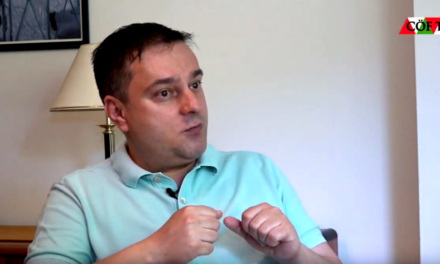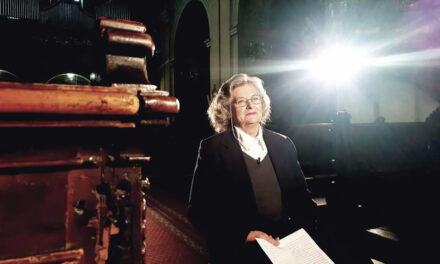One more word about cancellations.
Many people claim that history repeats itself, I don't think so. Mainly because identical historical situations can never be created, the world changes a lot in a single day, or in years and decades. But if they don't agree with this, I will bring up another argument: history cannot repeat itself because we learn from it, we learn from the mistakes we made, we store both what we did well and what we did not. This last argument is particularly dear to me because it promises - – that historical research work has concrete benefits. What is really misleading is that similar historical situations can indeed arise, mostly due to the similarities in the motivations and tools of the political actors. Therefore, I will now tell a story from which you can learn in today's turbulent political situation.
The starting point is always a mistake. Nowadays, it was a positive assessment of a pardon application. We don't know what could have been behind it, from our point of view it's not even interesting.
The opposition pounced on this mistake and launched a frontal attack against the political community in the government, sensing that a certain confusion had arisen, perhaps even some insecurity. The situation is somewhat similar to the situation that arose at the beginning of 1947. Then, an irresponsible group of people chatted about something after Sunday lunch in an apartment on Kecskemét Street, about how the communists would be treated if the Russian occupiers went home. The uncertain composition of the company included politicians and military officers close to the Small Farmers' Party.
The matter came to the attention of the ÁVO, and from there everything went on its way: wiretapping, installation of a provocateur, arrests, torture, confession. It is not an admission of real facts, but a justification of the concept of the ÁVO.
According to this, a huge fascist (Horthyist) armed conspiracy has taken place, endangering democracy not only in Hungary, but in the whole of Europe. The press campaign has started. In the (extreme) left-wing newspapers, Hungary was once again declared a nest of fascist conspirators. The Secretary General of the Small Farmers' Party, Béla Kovács, several representatives, and then the Prime Minister himself, Ferenc Nagy, were falsely linked to the "conspiracy". The voters of the small farmers' party were uncertain. But the West was also uncertain. Is it worth making even one move for Hungary? Is it worth rescuing him from the Russians' net?
One of the goals of the campaign was precisely that the answer should be "no". Even at the cost of soiling the nation. It worked.
What happened? The group of small farmers began to retreat. He only increased his already defensive behavior. His supporters began to desert him. Not to the left, 83 percent of the people did not even want to hear about Mátyas Rákosi and his criminal organization. Rather to the Freedom Party - Dezső Sulyok - who is currently on the rise. What did the smallholder management do? Secretary General Béla Kovács was dismissed and replaced by István Balogh (Pater Balogh) with a gelatinous spine. Then Ferenc Nagy and Béla Varga, the smallholder president of the National Assembly, made a deal with the communists and social democrats. Béla Kovács volunteered for "confrontations" at Andrássy út 60. It was a stupid deal. It's not even a bargain, it's more of a betrayal. Béla Kovács sensed the danger, but eventually entered the ÁVO headquarters. His work there was already in full swing when former State Secretary of Justice Zoltán Pfeiffer entered the building and somehow got Béla Kovács out of there. In vain, because the Soviet occupiers dragged him from his apartment that very evening, he was taken prisoner, from which he was only able to return home in 1955.
After the resignation and deportation of Béla Kovács, the disintegration of the small farmers' party began. Among others, Zoltán Pfeiffer also left. What happened? The lying propaganda machine continued to work.
The Soviet authorities, who are now handling the case jointly with the ÁVO and the People's Prosecutor's Office, have also presented an "incriminating testimony" to Ferenc Nagy. The prime minister tried to buy time, but in the end he also resigned. That they achieved this by blackmailing the meanest is not important now. Another disreputable small farmer with a gelatinous spine, Lajos Dinnyés, was appointed to replace Ferenc Nagy - a day before his resignation. The wave of departures continued: on June 2, Béla Varga, the President of the National Assembly, also left the country. The final collapse of the small farmers was led to the fact that on June 3, 1947, the crypto-communist, drunken István Dobi was "elected" as the party's president. Unable to identify with the changes, József Kővágó resigned from his position as mayor of Budapest on June 7. He was succeeded by József Bognár, who in his "backbone" could have been a member of parliament continuously from 1945 to 1990.
The propaganda of the (extreme) Left Bloc was blaring at 100 percent. Mass combat was also deployed. Crowds were ordered to the streets every day. They provoked fights. They prevented the development of the free press, making the daily newspaper "A Holnap" impossible.
The political consensus of 1945, which was based on human liberties, parliamentary democracy, and good relations with the Allied Powers, including the Soviet Union, the United States, and Great Britain, was uprooted. They demanded the premature dissolution of the National Assembly (its mandate lasted until November 1949!), a new suffrage law, and the introduction of planned management. The democratic and national political elite could not resist the frontal attack. After Ferenc Nagy and Béla Varga, Dezső Sulyok, the president of the Hungarian Freedom Party, was also forced to emigrate.
Zoltán Tildy, moving from reasonable cooperation to collaboration, dissolved the National Assembly after it passed an anti-democratic election law. The early elections were held under this auspices. In this regard, the Communist Party did not shy away from any kind of fraud. At least half a million people were purposefully excluded or "forgotten" from the contact list. On the day of the elections, 208,000 fake votes were cast according to the plans that emerged. Finally, after the elections, 670,000 National Democratic votes were destroyed, eliminating all the mandates of the Hungarian Independence Party.
And although the Communist Party, despite all the fraud, only got 22 percent, not even a year had passed after the first resignation, and it had already liquidated Hungarian parliamentarism and the rest of freedom rights.
Nobody paid any attention to the fact that half a year after the elections, half of the Social Democratic faction "resigned". Precisely those who were not enthusiastic about liquidating the party. Most of them emigrated, but some went to prison. Finally, they found an excuse to attack the President of the Republic, Zoltán Tildy, who had been "cooperating" until now. Her son-in-law was accused of espionage, and so Tildy finally resigned. But that hardly mattered anymore. During the "year of revolution", the leaders of all the democratic parties, Ferenc Nagy (FKGP), Dezső Sulyok (Freedom Party), István Barankovics (Democratic People's Party), Zoltán Pfeiffer (Independence Party), Margit Slachta (Christian Women's Tábor), Károly Peyer (Social Democratic Party).
The possibility of the rule of law was eliminated, along with human-political rights, parliamentarism, and the free press. External help was used for all of this, it could not have been otherwise. The Soviet troops stationed in Hungary ensured the full power of the communists. This corresponded to the imperial logic, but in no way does it absolve those who created and operated the dictatorship for forty years with lies, violence, fraud, and blackmail.
I don't know whether the esteemed reader sees a similarity in motivations, goals and means between the current (extreme) Left Bloc and the former one. I see. Above all, I see it in the open voice of undermining the constitution, the relativization of parliamentarism, lies, violence, trembling anger, hypocrisy, demanding and accepting external help, and completely giving up the future for the sake of power. We live in historic times, so I hope that we have learned from history so that it does not repeat itself.
Featured image: MTI/Noémi Bruzák












